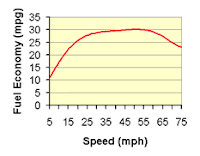 We're stealing part of our post title from Jim Hamilton, as he unofficially commissioned this tool in the comments section of his blog post!
We're stealing part of our post title from Jim Hamilton, as he unofficially commissioned this tool in the comments section of his blog post!
In his post, Jim ran very convincing numbers that fly in the face of what Tim "Drive Less" Haab might prefer as a course of action and in doing so, provided a workable solution for those for whom less driving may not be a viable option.
Drawing on a 1998 study by the U.S. Department of Energy, Jim recognized that most gasoline-powered vehicles in the U.S. are operated at speeds at which they do achieve their peak level of fuel efficiency. At highway speeds, for instance, the forces of aerodynamic drag can substantially increase the amount of fuel an automobile engine has to burn in order to sustain a high velocity. A quick back-of-the-envelope calculation reveals that the amount of drag force that a car being driven at 75 miles per hour sees is some 33% higher than the same car being driven at 65 miles per hour would see.
Meanwhile, as Jim notes, your car will burn more fuel at slower speeds compared to higher speeds, as automakers have optimized your car's engine to operate most efficiently at higher speeds.
 Somewhere in between lies a sweet spot into which you can get the most distance driving out for your fuel consumption dollar. And you can do so all without having to spend any extra out-of-pocket money. As an added bonus, if you do it right, you would even come out ahead of where you do today!
Somewhere in between lies a sweet spot into which you can get the most distance driving out for your fuel consumption dollar. And you can do so all without having to spend any extra out-of-pocket money. As an added bonus, if you do it right, you would even come out ahead of where you do today!
And that's where the tool we're introducing today comes in! We've reverse-engineered the Fuel Economy vs Speed average vehicle profile developed by the U.S. Department of Energy and combined it with Jim's math to demonstrate how you can either positively or negatively affect your pocketbook by driving either faster or slower than you do today.
Just enter your driving data into the tool below. We'll assume that your standard (non-hybrid) automobile shares the same fuel economy vs speed profile as the DOE's average vehicle, and then show how driving at a different speed than you do today for a given trip might affect your personal finances:
The cool thing about this tool is that you now have more weapons in your arsenal to help fend off the effects of higher gasoline prices! Armed with this information, you can now make whatever trade-offs you might need to your greatest advantage. For example, if getting the greatest possible savings is most important to you, you'll want to drive at speeds that produce the lowest equivalent cost per gallon of gas compared to your normal driving speeds. If you want to save gas money and time, you'll want to drive at speeds that give you the greatest equivalent "tax free" income compared to how you drive today.
Speaking of which, if you want to find out what fuel saving tips really work, Edmunds.com has done a number of real world tests to find out. Here's the short list of what really works, with our brief comments:
- Stop driving like a maniac. Moderate driving is better than aggressive (fast accelerating, brake slamming) driving. Update: Aaron notes in the comments at Jim Hamilton's original post that brisk acceleration, as perhaps opposed to "aggressive" acceleration is desirable from a fuel economy perspective.
- Lower speeds save gas. Not necessarily. The real secret is to drive consistently at speeds that enhance your vehicle's fuel efficiency, compared to either driving much faster or slower, which is the whole point being made by our tool above!
- Use cruise control. You just can't adjust your speed as often or as efficiently as your car's computer can!
- Don't idle your car for more than a minute. Going nowhere burns a lot of gas....
And here's what doesn't work:
- Turning your car's air conditioning off and opening windows. People who suggest this option in the summer are not your real friends. They really just want to see you suffer.
- Inflating tire pressure to maximum recommended levels. This is supposed to reduce your car's rolling friction. In reality, where fuel efficiency is concerned, your car just doesn't notice it that much.
And that concludes our contribution to Jim's public service announcement. And Art Carden's. And Bryan Caplan's. Etc....
Update 9 July 2008: Added a new results field to provide our approximation of your vehicle's mileage for driving at the alternate speed you entered!
Labels: economics, gas consumption, personal finance, tool
Welcome to the blogosphere's toolchest! Here, unlike other blogs dedicated to analyzing current events, we create easy-to-use, simple tools to do the math related to them so you can get in on the action too! If you would like to learn more about these tools, or if you would like to contribute ideas to develop for this blog, please e-mail us at:
ironman at politicalcalculations
Thanks in advance!
Closing values for previous trading day.
This site is primarily powered by:
CSS Validation
RSS Site Feed
JavaScript
The tools on this site are built using JavaScript. If you would like to learn more, one of the best free resources on the web is available at W3Schools.com.